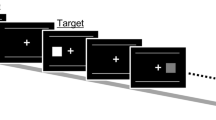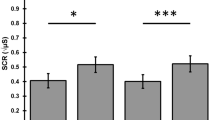Summary
The effects of brief shock as the punishing stimulus during a simple or choice reaction time task (SRT or CRT) and the change in skin resistance during a key-pressing response were investigated under various conditions. A slowing of the SRT and CRT occurred similarly during the shock phase under both the response-contingent and response-independent shock conditions. After the elimination of shock, the suppressive effect of contingent shock was still observed but an effect for independent shock disappeared at once (experiment 1). A facilitation of a punished response could be demonstrated under the discriminative punishment condition in which the unpunished response was available, although the CRT for the punished response showed an eventual slowdown as punishment trials progressed. By contrast, the unpunished response showed a slowdown of the CRT throughout the punishment period. Consequently, both the CRTs for the punished and the unpunished responses indicated similarly high values in the late stage of punishment. The removal of shock brought about a completely different trend for both types of responses; a suppression of the punished response was maintained but the CRT for the unpunished response recovered to the baseline level immediately (experiment 2). These results were explained by two distinct effects of punishment: a nonspecific emotionalizing effect arising from the punishment situation itself and a specific reaction to the punished response stemming from response-shock contingencies. The former effect could be easily affected by giving a pseudo-instruction in advance (experiments 3 and 4). Changes in skin resistance were mainly dependent upon the response-shock contingencies, but they did not parallel changes in the CRT for the punished response. The autonomic response rose and diminished prior to changes in overt behavior.
Similar content being viewed by others
References
Appel JB (1960) Some schedules involving aversive control. J Exp Anal Behav 3:349–359
Azrin NH, Holz WC (1966) Punishment. In: Honig WK (ed) Operant Behavior: Areas of research and application. Appleton-Century-Crofts, New York, pp 380–447
Black AH, Morse P (1961) Avoidance learning in dogs without a warning signal. J Exp Anal Behav 4:17–23
Bresh PJ, Garvin EA (1966) A pseudo conditioning effect of reaction time. J Exp Psychol 72:744–750
Brown JS, Martin RC, Morrow MW (1964) Self-punitive behavior in the rat: Facilitative effects of punishment on resistance to extinction. J Comp Physiol Psychol 57:127–133
Brush FR (1962) The effects of intertrial interval on avoidance learning in the rat. J Comp Physiol Psychol 55:888–892
Campbell BA, Smith NF, Misanin JR (1966) Effects of punishment on extinction of avoidance behavior: Avoidance-avoidance conflict or vicious circle behavior? J Comp Physiol Psychol 62:495–498
Church RM (1963) The varied effects of punishment on behavior. Psychol Rev 70:369–402
DiGiusto JA, DiGiusto EL, King MG (1974) Heart rate and muscle tension correlates of conditioned suppression in humans. J Exp Psychol 103:515–521
Dinsmoor JA (1954) Punishment: I. The avoidance hypothesis. Psychol Rev 61;34–46
Dinsmoor JA (1955) Punishment: II. An interpretation of empirical findings. Psychol Rev 62:96–105
Dunham PJ (1971) Punishment: Method and theory. Psychol Rev 78:58–70
Estes WK (1944) An experimental study of punishment. Psychol Monogr 57 (3, Whole No. 263)
Fowler H (1971) Suppression and facilitation by response contingent shock. In: Brush FR (ed) Aversive conditioning and learning. London Academic Press 537–604
Goerk AM, Kamin LJ (1959) Two effects of an “anxiety-eliciting” CS on human reaction latency. Psychol Rep 5:265–268
Gwinn GT (1949) The effects of punishment on acts motivated by fear. J Exp Psychol 39:260–269
Herman RL, Azrin NH (1964) Punishment by noise in an alternative response situation. J Exp Anal Behav 7:185–188
Holz WC, Azrin NH, Ayllon T (1963) Elimination of behavior of mental patients by response-produced extinction. J Exp Anal Behav 6:407–412
Imada H (1971) Experimental studies on pathological behavior in animals: Recent problems in experiments using aversive stimulation. Jap Psychol Rev 14:3–27 (in Japanese)
Kida M (1967a) Effects of anxiety on the figure-ground reversal phenomenon. Abstract Guide 31st Jap Psychol Congress 38 (in Japanese)
Kida M (1967b) Effects of anxiety on reaction time. Jap J Psychol 38:257–264 (in Japanese)
Kida M (1972) Effects of the non-specific anxiety and the conditioned anxiety on selective reaction time in man. Jap J Psychol 43:225–237 (in Japanese)
Kida M (1974) The effects of conditioned anxiety on selective reaction time and duration threshold in man. Jap J Psychol 44:305–316 (in Japanese)
Kida M (1982) Perceptual information processing relating to punished and unpunished responses in the emotionalized situation. Environ Med 26:75–84
Kida M, Osaka R (1981) Eye-movement and cognition processes for the conditioned emotional cue. Abstract Guide 45th Jap Psychol Congress 174 (in Japanese)
Martin B (1963) Reward and punishment associated with the same goal response: A factor in the learning of motives. Psychol Bull 60:441–451
Martin B, Ross LE (1964) Effects of consummatory response punishment on consummatory and runway behavior. J Comp Physiol Psychol 58:243–247
Melvin KB (1964) Escape learning and “vicious-circle: behavior as a function of percentage of reinforcement. J Comp Physiol Psychol 58:248–251
Melvin KB, Smith FH (1967) Self-punitive avoidance behavior in the rat. J Comp Physiol Psychol 63:533–535
Melvin KB, Stenmark DE (1968) Facilitative effects of punishment on establishment of a fear motivated response. J Comp Physiol Psychol 65:517–519
Mowrer OH (1950) Learning theory and personality dynamics. Ronald Press, New York
Seligman MEP, Campbell BA (1965) Effect of intensity and duration of punishment on extinction of an avoidance response. J Comp Physiol Psychol 59:295–297
Solley CM, Murphy G (1960) Development of the perceptual world. Basic Books, New York
Solomon RL (1964) Punishment. American Psychologist 19:239–253
Solomon RL, Kamin LJ, Wynne LC (1953) Traumatic avoidance learning: The outcomes of several extinction procedures with dogs. J Abnorm Soci Psychol 48:291–302
Author information
Authors and Affiliations
Rights and permissions
About this article
Cite this article
Kida, M. Facilitative and suppressive effects of punishment on the reaction time in humans under various conditions. Psychol. Res 45, 187–214 (1983). https://doi.org/10.1007/BF00308669
Received:
Issue Date:
DOI: https://doi.org/10.1007/BF00308669




